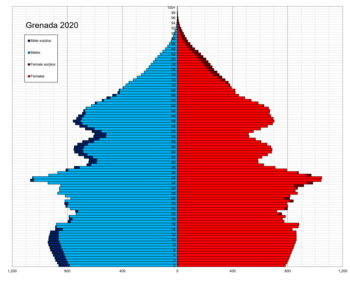| Demographics of Grenada | |
|---|---|
 Population pyramid of Grenada in 2020 | |
| Population | 113,949 (2022 est.) |
| Growth rate | 0.32% (2022 est.) |
| Birth rate | 13.94 births/1,000 population (2022 est.) |
| Death rate | 8.31 deaths/1,000 population (2022 est.) |
| Life expectancy | 75.74 years |
| • male | 73.13 years |
| • female | 78.6 years |
| Fertility rate | 1.93 children born/woman (2022 est.) |
| Infant mortality rate | 9.4 deaths/1,000 live births |
| Net migration rate | -2.43 migrant(s)/1,000 population (2022 est.) |
| Age structure | |
| 0–14 years | 23.23% |
| 65 and over | 10.89% |
| Sex ratio | |
| Total | 1.03 male(s)/female (2022 est.) |
| At birth | 1.1 male(s)/female |
| Under 15 | 1.09 male(s)/female |
| 65 and over | 0.69 male(s)/female |
| Nationality | |
| Nationality | Grenadian |
| Major ethnic | African descent (82.4%) |
The demography of the people of Grenada, Grenadians /ɡrəˈneɪdiːənz/, includes population density, ethnicity, education level, health of the populace, economic status, religious affiliations and other aspects of the population.
| Year | Pop. | ±% p.a. |
|---|---|---|
| 1871 | 37,684 | — |
| 1881 | 42,403 | +1.19% |
| 1891 | 53,209 | +2.30% |
| 1901 | 63,438 | +1.77% |
| 1911 | 66,750 | +0.51% |
| 1921 | 66,302 | −0.07% |
| 1946 | 72,387 | +0.35% |
| 1960 | 88,677 | +1.46% |
| 1970 | 92,775 | +0.45% |
| 1981 | 89,088 | −0.37% |
| 1991 | 85,123 | −0.45% |
| 2001 | 103,137 | +1.94% |
| 2011 | 105,539 | +0.23% |
| Source:[1][2] | ||
- ^ "Archived copy" (PDF). Archived from the original (PDF) on 2015-09-23. Retrieved 2013-12-30.
{{cite web}}: CS1 maint: archived copy as title (link) - ^ "Archived copy" (PDF). Archived from the original (PDF) on 2018-07-13. Retrieved 2018-09-27.
{{cite web}}: CS1 maint: archived copy as title (link)